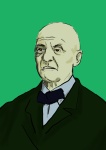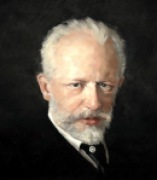 …only notes that aren’t high enough. At least, that would be the view of two or three of the East of England Singers’ first sopranos.
…only notes that aren’t high enough. At least, that would be the view of two or three of the East of England Singers’ first sopranos.
The human voice is an extraordinary instrument. Have you noticed how the pitch of a person’s speaking voice is not indicative of the pitch and range of their singing voice? If anyone knows why this is, explanations on a postcard in the comment box would be gratefully received.
Bruckner (1824-1896) composed some of the most wonderful music of the Romantic period. He was a man of deep faith a nd something of an oddball. His Mass No 2 in E minor, the second half of Saturday’s concert, will fulfil some of the soprano high note dreams, and indeed the similar dreams of singers of other parts, particularly during the Sanctus for eight-part choir. Eight parts enabled Bruckner to employ the full range of the human voice in all its glory and for the glory of God.
nd something of an oddball. His Mass No 2 in E minor, the second half of Saturday’s concert, will fulfil some of the soprano high note dreams, and indeed the similar dreams of singers of other parts, particularly during the Sanctus for eight-part choir. Eight parts enabled Bruckner to employ the full range of the human voice in all its glory and for the glory of God.
As you can see in the video, the Mass is accompanied by a wind ensemble.
The East of England Singers and New Classical Wind Ensemble concert is on Saturday, 17th October, at St John’s Church, Mansfield Rd, Carrington, Nottingham, 7.30pm. Tickets will be available on the door (until sold out).
Tickets are now on sale for the East of England Singers Christmas concert of Bach’s Magnificat and Vaughan Williams’ Fantasia on Christmas Carols, and for Music for Everyone’s Christmas is Coming – a Sunday afternoon feast of Christmas music by and for all ages.

 violin and piano, six symphonies and other orchestral works. He wrote songs, instrumental music and opera, the best known of which is Eugene Onegin. He was a troubled man from a young age until his death. Whether he died from natural causes or suicide remains a point of conjecture. He wrote music of passion and deep emotion, but by no means all melancholic. Music, it’s good for the soul.
violin and piano, six symphonies and other orchestral works. He wrote songs, instrumental music and opera, the best known of which is Eugene Onegin. He was a troubled man from a young age until his death. Whether he died from natural causes or suicide remains a point of conjecture. He wrote music of passion and deep emotion, but by no means all melancholic. Music, it’s good for the soul.